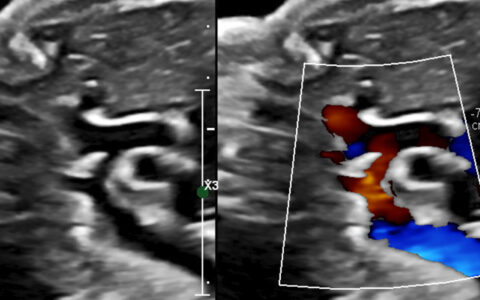A large existing data set that explored whether infants are more likely to benefit from steroids during heart surgery has been re-analyzed, yielding valuable new insights that were published in two follow-up papers.
The New England Journal of Medicine published the original report on the Steroids to Reduce Systemic Inflammation after Infant Heart Surgery trial in 2022. This data-rich resource on the STRESS trial was ripe for continued investigation.
“The key takeaway of our recent study that ran in Critical Care Medicine was that administering steroids intraoperatively does seem to help reduce the need for them post-operatively, without causing significant harm,” said Sudeep Sunthankar, MD, a physician-researcher at Monroe Carell Jr. Children’s Hospital at Vanderbilt. A second follow-up study was published in Pediatric Cardiology.
“Within the entire cohort, prophylactic methylprednisolone was strongly associated with a reduction in hydrocortisone exposure postoperatively,” the authors wrote in Critical Care Medicine. Furthermore, they found that intraoperative methylprednisolone use did not increase the incidence of postoperative infection rates for any of the included subpopulations.
“Within the entire cohort, prophylactic methylprednisolone was strongly associated with a reduction in hydrocortisone exposure postoperatively.”
Value in a Rich Data Set
A randomized, prospective, registry-based study, the STRESS trial enrolled infants undergoing heart surgery with cardiopulmonary bypass who received either prophylactic methylprednisolone or placebo.
“Before the STRESS trial was done, there had been several single- or dual-center studies looking at this issue, but the numbers were much smaller,” Sunthankar said. “The STRESS trial data set was based on 1,200 patients treated at 24 different centers, so it removed single-center bias.”
Risks of Postoperative Steroids
Sunthankar said that inflammation starts to develop in the body during surgery, and that the application of steroids can help calm that response.
The researchers specifically asked whether steroids administered prophylactically during surgery might lead to better outcomes than waiting until after the inflammation arises post-operatively, Sunthankar explained.
“Could the steroids prevent those worse outcomes from occurring and reduce the need for rescue steroids?” he said.
More studies are underway.
“For our follow-up research, we have been diving deeper into this rich data set to learn more about specific outcomes where we noted improvement,” he said.
Weighing Adverse Effects
The STRESS trial participants included infants aged 12 months or younger who underwent heart surgery with cardiopulmonary bypass. The subjects were categorized by age, gestational age, and the presence or absence of a chromosomal or syndromic diagnosis. They were also classified using mortality categories defined by the Society of Thoracic Surgeons-European Association for Cardio-Thoracic Surgery Congenital Heart Surgery.
“In the Critical Care Medicine study, we did see an increase in blood glucose levels and the need for insulin,” Sunthankar said.
Other researchers have found that issues with glycemic control after surgery for congenital heart defects do not necessarily lead to worse outcomes, he added.
Reducing Need for Reinterventions
For the second publication, in Pediatric Cardiology, the researchers looked at severe outcomes up to and including death among infants who did and did not receive methylprednisolone during surgery.
“We found no difference in the length of stay for the two groups of patients. Administering steroids was not causing an adverse event that was lengthening stay,” he said.
Infants undergoing STAT Mortality Categories 1 to 3 operations, those of term gestational age, and those without a chromosomal or syndromic diagnosis had fewer reoperations for bleeding when intraoperative steroids were administered.
“Unplanned catheterization or surgical reinterventions were [also] less frequent in those undergoing STAT Mortality 1 to 3 operations when receiving methylprednisolone compared to placebo,” the team wrote.
These findings, which the authors acknowledge were drawn from underpowered data, given the relative infrequent occurrence of events, suggest that prophylactic methylprednisolone is not associated with significant harm and may benefit certain subgroups of patients.
Looking Ahead
“Both follow-up studies strongly suggest that the risk of steroids may be tolerable in certain subpopulations. The risk appears to be minimal, and there may be some benefit,” Sunthankar said. He added the need remains for further research focusing on specific outcomes in specific subpopulations.
“But this is good foundational work to encourage those future studies.”
“Both studies strongly suggest that the risk of steroids may be tolerable in certain subpopulations.”





